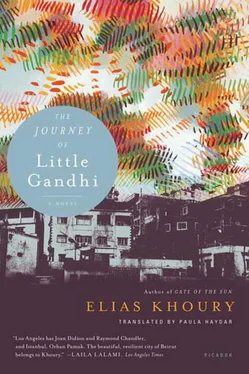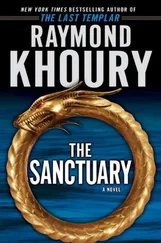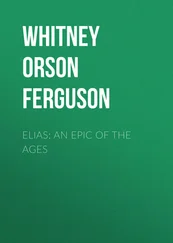Once she told me about her death. She said things I don’t remember, and I can’t compose. She said how death was the end of comfort, death was the beginning of weariness. I didn’t understand what she meant until I went to search for her at the nursing home in Ashrafiyyeh. I went and asked about the Reverend Amin, and so the nun came out to see me. I left without finding out anything. Everything had changed. After ten years of war Ashrafiyyeh had changed. “Little Mountain” was no longer a mountain, it had become like back roads we don’t know well. People’s faces changed. Even the old smell, I didn’t find, except in Saint Mitr Cemetery.
I asked the nun and she said she hadn’t heard the name Reverend Amin before, and that they didn’t take in anyone from other denominations. I told her Alice brought him in 1981, and I tried to describe this man, whom I’d never seen in my life. The nun said she knew nothing about it, and she’d been there for twenty years. She’d never seen a Protestant minister in her life. I said the man was senile, maybe he’d forgotten his name, maybe he was there under a different name, and I tried to remember the Greek words Alice told me he’d use to pray all day long.
I asked her about Alice, had she come to the nursing home.
She asked me her family name.
I said, I don’t know.
She asked me about her relatives.
I said, I don’t know.
She asked me who she was.
I said, I don’t know.
The nun said I was asking about imaginary names, she didn’t know any Alice, or any Reverend, and she doubted my mental competence.
I asked her where they buried the people who died at the nursing home. She said they didn’t bury them, their relatives would come and take care of all that.
And those who had no relatives? I asked.
Those we bury in the nursing home cemetery, then they’re taken a year or more later, depending on the decay of the corpse, and placed in a well.
I asked her if they wrote the names of the deceased on the nursing home graves.
She said no. She asked me why I was asking such questions, so I smiled. The nun said I was crazy, and that I was asking about things that didn’t exist. She patted me on the shoulder and told me the war had made everyone lose their minds. She offered me a cup of coffee. I drank it quickly and burnt my tongue, and I left the nursing home.
I went to Saint Mitr Cemetery. I searched among the scattered graves beneath the cypress trees. I read all the names, and on a half-destroyed grave, whose white tile had become dust-colored, I saw the image of Alice. I went closer and read the name, it was someone else, but the image engraved on the semiwhite marble resembled Alice as a young woman. That’s how I imagined Alice in her youth, with a full face, thick lips, a small turned-up nose, big eyes. I went closer to Alice, or to whom I thought was Alice, and I read my own name, and I read my mother’s name, and I read my grandfather’s name. They were all there, there wasn’t a face I saw that I hadn’t seen before, it was like a long dream from which I couldn’t wake up.
I stood there a long time, then I came back to where I was, behind this green table, beneath this orange light in which the light fades. I closed my eyes and saw Gandhi. I saw a short man walking between the walls of the city. The city was made up of opposing walls, and the short man was walking, the shoe-shine box hanging around his neck, his head banging against the walls as he tried to find his way. He walked between the walls, stretching his hands out as if he were swimming in water that circled around him, swallowing him down.
The water that is swallowing him sweeps me away to the abyss, where I walk, and see all their faces: Spiro and Fawziyya and Malku and Suad and Abd al-Hakim and Davis, and Nuha and Lillian and Constantine and Abu Abbas and Tannous, and Abu Jamil and Husn and Rima and Sheikh Zakariyya and the Gypsy woman and the dog and Doctor Atef and Father John and Alice and Sunbuk and Abu Hurayra’s tomb, and Zaylaa and “The Leader” and Alfred and Vitsky and Simaan Fayyad and his grandfather and Bishop Athanasios and the nun and Joséf and Master Ahmad and the little mountain and Shukri the poet, and Saint Spirodonious and his donkeys, and the soldiers’ black boots, and the newspapers whose words fled from them, and the vendors, and Abu Saeed al-Munla sleeping under the screams of his minaret, and Malku, who immigrated to Sweden, and Little Spiro, whose name was Nabil.
I see them and I see the faces of the soldiers, from where did the city get filled up with soldiers? The city is dimming, its trees are burning, and the soldiers start the fires.
I told Alice, but she wasn’t with me. She promised me she’d come with me. She promised me she’d take me to visit them all. But she didn’t come. When I decided to meet them, she disappeared, and when I went to look for her, I didn’t find the grave. She left me without letting me know anything. She took all the knowledge and left.
When I tell it, I don’t tell anything. I tell about it and I don’t quench my thirst, and I go on my journey to it, and don’t find it. I find words that dangle like a rope, I climb the rope and I slip, and when I tumble to the ground, I see the walls collapse and the city migrate.
Alice didn’t fool me. She lied to me a lot. She knew I wanted to hear stories for the sake of hearing stories. She let me hear what I wanted, and when I wanted to stop hearing the stories, I discovered that the stories died beneath my pen.
That’s how the story ended.
Little Gandhi was, a man who lived and died, like millions of men, on the face of this spinning earth.
He was born in Mashta Hasan, ran away from his father, who took him to his grandfather’s cave, worked in the “key’s” Bakery in Tripoli, moved to Beirut, where he worked at Abu Ayoun’s restaurant, and then worked as a shoe shiner. He got married and had two children, Husn and Suad. Husn was a barber, and Suad was sick. He loved life and loved the flavor of it. Alice told him, and the Reverend Amin befriended him, and Davis turned him into a restaurant owner, and the dog died, and Gandhi grieved over the dog more than he grieved over his own father.
Gandhi died.
He died when Beirut fell beneath the black shoes. He didn’t know that he died. He sensed death before it came, then when he died, he didn’t know. And so the bullets didn’t hurt him, and death came lightly, like a short dream that doesn’t end.
Gandhi died, and Alice became a maid at the Salonica Hotel. The Reverend Amin became senile and ended up in a nursing home. The American went back to his country, and Malku immigrated to Sweden, and Spiro died trying to give his name to his grandson.
A long journey, because it’s short.
Journeys always last long because they fall short. The man in whose eyes the world clouded up tried to take on life with his kabbout. The doctor laughed at the kabbout, and the pharmacist acted like a clown, and Gandhi died.
His name was not Gandhi.
Abd al-Karim, son of Husn, son of Abd al-Karim, son of Husn, son of Abd al-Karim, son of Husn, and all the way back to Noah.
They named him Gandhi and he didn’t know why.
But he knew why he died, he knew the bullets weren’t aimed at him, but rather at the heart of a city that destroyed itself, because it was like Gandhi, it was trying to make a story out of its name.
And the story is a game of names. “And he taught Adam all the names.” When we knew the names, the story began, and when the names were extinguished, the story began.

Читать дальше













